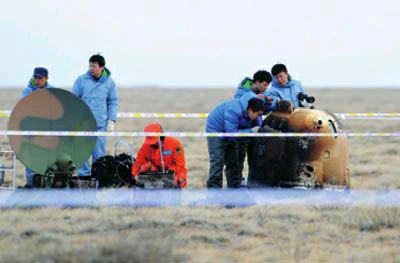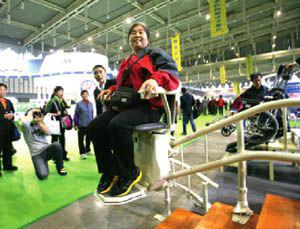Return From the Moon
2014-12-01
Researchers retrieve the return capsule of Chinas unmanned lunar orbiter in the central region of north Chinas Inner Mongolia Autonomous Region on November 1.
The test lunar orbiter, nicknamed Xiaofei, was launched on October 24 and traversed 840,000 km on its eightday mission in which it rounded the far side of the moon to take some incredible pictures of Earth and the moon together.
It was the worlds first round-trip mission to the moon in some 40 years, making China the third nation to do so after the former Soviet Union and the United States.
Anti-Corruption Agency
China will establish a new anti-graft body to put further pressure on corrupt officials, Deputy Procurator General Qiu Xueqiang has said.
Qiu told Xinhua in an exclusive interview that the plan for a new anti-graft agency was put forward by the Party committee of the Supreme Peoples Procuratorate (SPP) and was approved by the central authority.
A vice-ministerial level, full-time member of the procuratorial committee will hold a concurrent post as head of the new anti-graft agency. The new agency will be better organized and better able to help the SPP handle major cases and break institutional obstacles.
China established the anti-corruption bureau under the SPP in 1995. After almost 20 years of development, it has struggled to meet demands due to ineffectiveness in handling corruption cases.
More Students Abroad
The government-sponsored China Scholarship Council (CSC) on October 30 said it will send 25,000 students abroad next year, 17 percent more than in 2014.
An official with the CSC said the expansion will include up to 8,000 more Chinese graduate and doctorate students.
The official said the CSC have sent 20,400 students abroad in 2014, making a total of 46,000 students in 85 countries supported by the CSC.
The council has established programs with some international organizations. In July, it signed an agreement with the UNESCO to send interns there.
Since 1996, the CSC has sent over 160,000 Chinese students to study abroad, and 98 percent of them have returned home.
Quantum Network
China will build a global quantum communication network by 2030, according to a leading Chinese quantum physicist on November 2.
“Chinas quantum information science and technology is developing very fast and China leads in some areas in this field,” said Pan Jianwei, a Chinese quantum scientist and professor at the University of Science and Technology of China.
The field of quantum communication, the science of transmitting quantum states from one place to another, has grabbed global attention in recent years since the discovery of quantum cryptography, which is described as a way of creating “unbreakable” codes.
China will achieve Asia-Europe intercontinental quantum key distribution in 2020 and build a global quantum communication network in 2030, said Pan at the 2014 International Conference on Quantum Communication, Measurement and Computing, which opened on November 2 in Hefei, Anhui Province.
This is the first time that China has hosted the influential biannual quantum conference, which lasted until November 6.
More than 400 experts from 28 countries and regions discussed research, achievements and industrialization in the quantum information field during the meeting.
Anti-Drone Laser
China has successfully tested a homemade laser defense system for targeting small-scale drones flying at low altitude.
The machine is able to shoot down various small aircraft within a 2-km radius and can do so within 5 seconds of locating its target, said a statement released on November 2 by the China Academy of Engineering Physics, one of the systems co-developers.
Characterized by its speed, precision and low noise, the system is designed to destroy unmanned, smallscale drones flying within an altitude of 500 meters and at a speed below 50 meters per second, it said.
The new laser system, which will either be installed or transported in vehicles, is expected to play a key role in ensuring security during major events in urban areas, the statement said, adding that a recent test saw the machine successfully shoot down more than 30 drones—a 100-percent success rate.
Political Ability
The “political ability” of rural Chinese people is at a medium level and more than half believe going to court is too much trouble, according to a Chinese university research report on October 30.
The report surveyed more than 4,000 residents in 242 villages nationwide from 2013 to 2014.
The overall political ability index of non-urbanites in China was calculated at 0.59, medium level (between 0.4 and 0.6), according to the report by the center for Chinese rural studies at the Central China Normal University.
Anywhere between 0.6 and 0.8 is considered high and 0.8-1.0 is very high. The index uses 36 categories, both objective and subjective, covering political knowledge, awareness, attitude and participation.
Rural people with high income and good education care more about political events and are more likely to join in public affairs.
Medical Aid
Working staff in the Kotoka International Airport of Ghana unload medical aid materials, including protective clothing and goggles, sprayers, gauze masks, body thermometers as well as temperature monitors, from China on October 29.
Starting from April this year, China, the first foreign country to provide assistance to the affected nations, has delivered four batches of emergency relief items worth$122 million.
Traffic Control
An odd-even license plate policy for cars, including those from outside Beijing, is put in place from November 3 to 12, in an effort to improve air quality during the Asia-Pacific Economic Cooperation Economic Leaders Meeting.
According to the Beijing Municipal Environmental Protection Bureau, starting from November 3, 70 percent of the municipal governments vehicles, around 19,000 of its fleet, faced driving restrictions.
Beijing imposed a traffic ban based on an odd-even license plate system during the 2008 Olympics, which saw 45 percent of the citys cars off the roads and helped clear the skies.
Railway for Tibet
China has approved construction of a railway linking Lhasa, capital city of Tibet Autonomous Region to Nyingchi in its east, local authorities said on October 31.
According to the plan approved by the National Development and Reform Commission (NDRC), the Lhasa-Nyingchi section of the Sichuan-Tibet Railway runs 402 km from Nyingchi to Xierong, a stop on the Lhasa-Xigaze line.
The 32-km section from Xierong to Lhasa will be electrified.
The new Tibet line was one of the three rail lines approved by the NDRC, the countrys top economic planning body. The other two are from Ordos in the northern Inner Mongolia Autonomous Region to Jian in the eastern Jiangxi Province, and from Datong in the northern Shanxi Province to Zhangjiakou in neighboring Hebei Province. The total investment of the three is 250 billion yuan ($40 billion).
The Tibet project will cost 36.6 billion yuan ($5.95 billion) and take seven years to complete. The state-owned China Railway Corporation will build and operate the line.
Moderate PMI
Activity in Chinas service sector continued to moderate in October, with the purchasing managers index(PMI) for the non-manufacturing sector sliding to its lowest point since January, official statistics showed on November 3.
The non-manufacturing sector PMI posted at 53.8 percent in October, down 0.2 percentage points from September, according to a report jointly released by the National Bureau of Statistics (NBS) and the China Federation of Logistics and Purchasing (CFLP).
The countrys official manufacturing PMI also dropped to a five-month low of 50.8 percent in October from 51.1 percent in September, according to data released by the NBS and CFLP on November 1.
However, the readings were still above the 50-percent boom-bust line, which separates expansion from contraction on a monthly basis.
“Although the index pulled back slightly, it is still running smoothly, with some signs of good development demonstrated,” said Cai Jin, Vice President of CFLP.
Information Sharing
Chinese courts and banks will establish an information sharing system to punish court order defaulters and facilitate enforcement, the Supreme Peoples Court (SPC) announced on November 2.
The SPC and the China Banking Regulatory Commission have jointly issued a circular on sharing such information online, and according to the circular, Chinese banks will take measures such as restrictions on loans and issuing credit cards to people who have defaulted on court orders.
The banks will also help the courts in information inquiry, fund freezing and seizing regarding such defaulterscases, the circular said.
However, the circular also stressed that such measures must be taken with due procedures and fund security being guaranteed.
Preparing for a Harvest
A consumer picks corn seed at the Liaoning Shenyang Seed Trade Fair.
The three-day fair, opened on November 3, attracted more than 1,000 enterprises, research institutions and farmers, with the theme of “picking safe and quality seeds.”
Reassuring Car Owners
Chinas quality watchdog demanded joint-venture FAW-Volkswagen submit new materials to verify the effectiveness of a latest recall due to defective rear axles.
On October 17, the company announced a recall of more than 581,000 cars, including its New Sagitar and Beetle vehicles, as the trailing arms of the rear axles could rupture in certain scenarios. It offered to place a metal plate in the trailing arm to ensure the proper operation in case of a rupture.
Chinas General Administration of Quality Supervision, Inspection and Quarantine (AQSIQ) said in a statement on November 1 that its defective product management center has ordered the company to provide further materials for verifying the recall measures effectiveness.
The AQSIQ also ordered its management center to devote more technological resources to the case and organize assessment of FAWVolkswagens recall by inspection bodies and industry experts.
The center asked affected car owners to contact the companys dealers for examination in the case of a trailing arm deformation or a rupture and also to report the problem to the center online, the statement said.
New Air Route
China Eastern Airlines will launch the first route from Shanghai to Nepals capital Katmandu on December 2, the company said on November 1.
The new daily flight will use a Boeing 737 aircraft, and flights in both directions will be via Kunming, capital city of southwest Chinas Yunnan Province.
Nepal has been attracting more and more Chinese visitors in recent years with its natural landscape, as well as cultural and religious heritage. Data showed that Chinese people visiting Nepal at their first stop stood at 51,400 in the first half of 2014, up by 22.41 percent from a year ago.
Currently, Air China is operating flights from Chengdu, capital of southwest Chinas Sichuan Province, to Katmandu, and China Southern Airlines is operating flights from Guangzhou, capital city of south Chinas Guangdong Province, to the same location.
Twilight Years That Sparkle
An old lady tests out an intelligent lift chair at the 2014 China Senior Citizen Exposition held in Nanjing, Jiangsu Province, from October 31 to November 2.
Industrial Park
China and Germany have joined hands in building an industrial park to bolster technological upgrade in Chinas industry-intensive northeast.
Located in Shenyang, capital city of Liaoning Province, the 120-square-km park will be home to a host of industries such as assembling, automobiles, chemistry, medicine and electronics.
Aiming to enhance cooperation and exchanges, the move will help boost technological upgrade in northeast China, with both parties focusing on emerging sectors of high-end machine tools, robotics, 3D printing and others, said Yan Bingzhe, a local official in Shenyang.
Amid growing bilateral relations, trade between China and Germany is closer than ever. By the end of 2013, some 400 German enterprises had opened branches in Liaoning, creating$2.1 billion worth of foreign capital.
Anti-Dumping Review
The Ministry of Commerce began a review of its anti-dumping measures on adipic acid from the United States, the EU and the South Korea on November 1.
The sunset review of the five-year measures, first imposed on November 1, 2009, will last for 12 months ending on November 1 next year, according to the ministry.
The review comes after four domestic companies said dumping or damages to the domestic industry would reoccur if anti-dumping measures were terminated.
During the review period, adipic acid imports from South Korea will still be subject to anti-dumping duties ranging from 5.9 percent to 16.7 percent.
Meanwhile, imports from the United States and the EU will be subject to levies from 5 percent to 35.4 percent.
Adipic acid is primarily used in the production of nylon 6-6, polyurethane foam and polyester resins.
Oil Price Cut
The National Development and Reform Commission cut the retail price of gasoline by 245 yuan per ton ($39.86) and of diesel by 235 yuan ($38.32) on November 1.
The adjustment means retail prices will drop by 0.18 yuan per liter for gas and 0.2 yuan per liter for diesel.
The cut is the seventh since July, as international crude prices continue to slide.
The latest price cut will bring retail fuel prices to below 7 yuan per liter($4.34 per gallon) in most regions.
China has a pricing regime that adjusts domestic fuel prices when international crude prices change by more than 50 yuan ($8.15) per ton for 10 working days.
